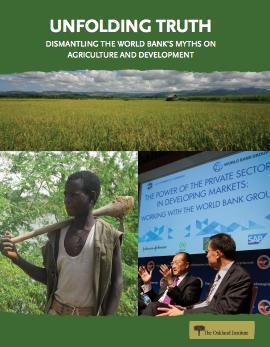Unfolding Truth: Dismantling the World Bank’s Myths on Agriculture and Development
In the 1980s and 1990s, the World Bank and International Monetary Fund’s (IMF) intervention in developing countries’ national policies, through aid conditionality and austerity programs known as Structural Adjustments Programs (SAPs), triggered a wave of global resistance against the International Financial Institutions (IFIs). in the face of growing criticism that these policies increased poverty, debt, and dependency on rich countries, saps were eventually withdrawn in 2002; however the World Bank, through renewed means, continues to pursue and impose its neoliberal agenda on the developing world.
Executive Summary:
In the 1980s and 1990s, the World Bank and International Monetary Fund’s (IMF) intervention in developing countries’ national policies, through aid conditionality and austerity programs known as Structural Adjustments Programs (SAPs), triggered a wave of global resistance against the International Financial Institutions (IFIs). In the face of growing criticism that these policies increased poverty, debt, and dependency on rich countries, SAPs were eventually withdrawn in 2002; however the World Bank, through renewed means, continues to pursue and impose its neoliberal agenda on the developing world.
The World Bank’s ability to influence government policies stems from its tremendous economic power. In 2012, the Bank’s total lending to developing countries reached $35 billion,1 over a quarter of the total global Official Development Assistance (an international indicator of aid flow) for the same year.2 Additionally, through the annual publication of its Doing Business report, a country-by-country economic ranking on the “ease of doing business,” the Bank sets standards for investors, bilateral donors, and development institutions around the world and pressures countries to improve their rating by enacting neoliberal regulatory reforms.3
Despite its positive veneer, the report encourages governments to eliminate economic, social, and environmental safeguards and promotes competition among countries for higher rankings and, consequently, higher foreign direct investment.4 The Bank’s financial power and political leverage has made it difficult for cash-poor countries to oppose the institution, while its ability to manage public image through perpetuation of myths around its mission and activities has enabled the Bank to withstand its critics.
In the agricultural domain for instance, the Bank claims to work to secure farmers’ access to land; however its direct financing to firms practicing large-scale and export-oriented agriculture is increasing pressure on land, water, and forests. In several countries, including Honduras and Lao People’s Democratic Republic (PDR), the Bank has directly supported investors that are grabbing land from local populations and that involve significant human rights violations.5 Recently, the Bank’s proposal to revise its environmental and social safeguard policies triggered concern that the institution will increase financing of projects that are damaging for the environment and local communities.6
The World Bank’s agriculture-related projects, which it claims aim to defend the interests of smallholders, in fact negate the potential of small-scale agriculture and agroecological practices to bring sustainable and inclusive development to countries. With the stated goal to increase smallholders’ productivity and integrate them in the global market, the Bank promotes contract-farming schemes and the adoption of input-intensive techniques. This glosses over the food security and dependence risks associated with making farmers and countries’ agricultural production reliant on deeply oligopolistic international markets, where for instance only three companies, Monsanto, DuPont and Syngenta, control 50% of the world production of commercial seeds.7
In reality, since the 1980s, the Bank has pushed an export-based, neoliberal vision of agriculture that exposes farmers to the rules of volatile, competitive global markets and denies them adequate support from their governments. The Bank considers that states’ interventions on agricultural markets are an impediment to growth and discards examples such as Indonesia, where active price support for farmers’ production and trade interventionism prevented increases in food prices in 2008.8
The 2008 high food price crisis, which provided a striking example of the flaws of international agricultural markets, did not shift the Bank’s strategy. The institution continues to promote the notion that open markets for the private sector will bring growth and lead to better rural development than state-led programs. As a result, the Bank pressures governments to incentivize foreign direct investment (FDI), its silver bullet to replace public intervention in agriculture. However, World Bank–supported policies to attract FDI in countries without proper institutional, social and environmental safeguards have spurred land grabbing and displacement of local populations (Box 1) without bringing development outcomes.9
In 2014, the Our Land Our Business campaign was launched to denounce the role of the World Bank’s Doing Business report and new Benchmarking the Business of Agriculture (BBA) project, which steer policy makers toward adopting reforms that incentivize private investment in agriculture.10 Through such tools, the World Bank pressures countries to cultivate business-friendly environments for foreign investors in agriculture, hampering the formulation of sound national agricultural policies. These could include price insurance
policies for producers, programs of support to farmers’ cooperatives, creation of knowledge sharing and reliance building programs, and enhancing farmers’ investment in productive activities through ensuring their sustained access to land and natural resources.11
Overall, while the name has changed, the game remains unchanged from the days of SAPs. Neoliberal policies are still imposed on governments of the developing world that perpetuate inequality and a race to the bottom through exploitation and marginalization of the poorest countries, their land and people. It is time to tackle the myths that World Bank perpetuates under the guise of development strategy, to question the “growth at all cost” agenda, and to ensure governments and populations control their economic destinies.


